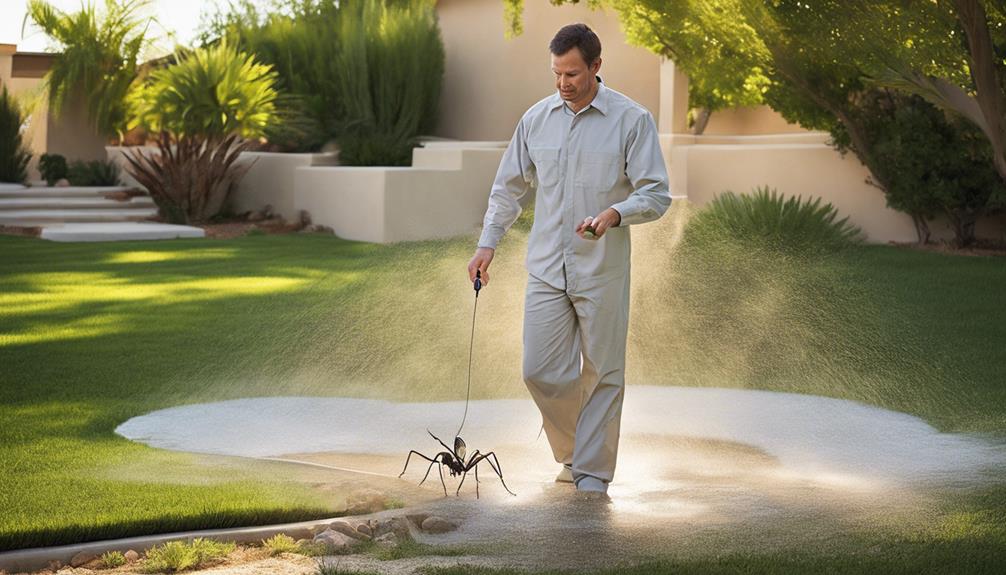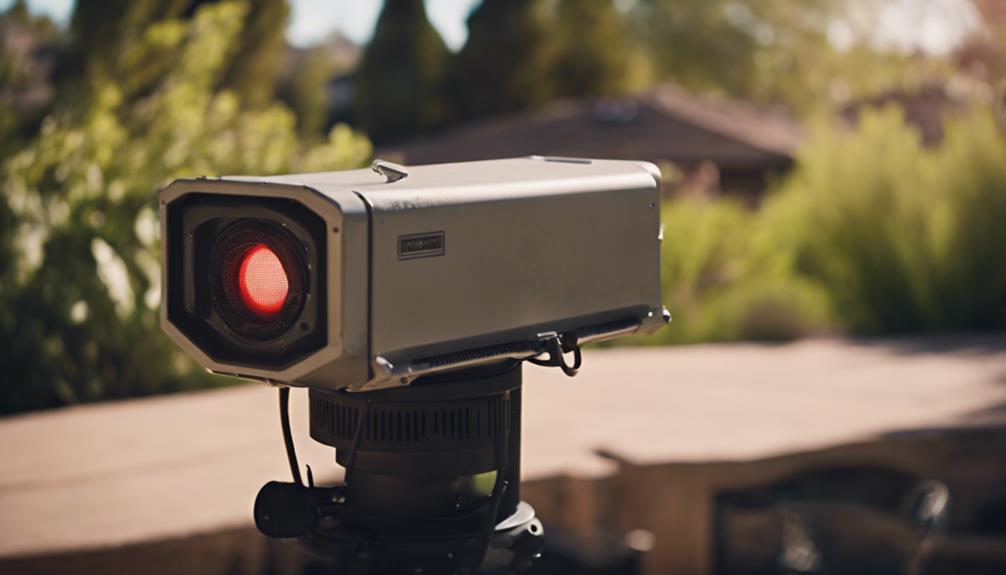Prepare for mosquito season in St. George as warm, humid weather fosters ideal breeding conditions. Female mosquitoes lay eggs near stagnant water, which hatch into disease-carrying adults. Eliminate puddles and containers to control population. Common diseases spread include West Nile and Zika. Prevention tips: Use 20-30% DEET repellent, wear long clothes, drain standing water, and keep doors shut. Local abatement programs inspect and treat breeding sites. Safety measures for outdoor activities: apply repellent, limit outings from dusk to dawn, wear long clothing, and maintain screens. Understanding these factors is important for a safe and enjoyable season.
Key Takeaways
- Mosquito season in St. George thrives in warm, humid weather.
- Stagnant water sources are breeding grounds for mosquitoes in St. George.
- Mosquito abatement programs are active in St. George to control populations.
- Diseases like West Nile virus and Zika are transmitted by mosquitoes in St. George.
- Prevention measures include using insect repellent and draining standing water.
Mosquito Behavior and Breeding Habits

Understanding how mosquitoes behave and where they breed is vital for effective mosquito control in St. George. Female mosquitoes are the ones responsible for laying eggs near stagnant water sources like puddles, ponds, and even small containers.
Once the eggs are laid, they hatch into larvae, which then develop into adult mosquitoes. The warm and humid weather in St. George provides the ideal conditions for mosquitoes to breed and multiply rapidly.
To control the mosquito population, it’s essential to eliminate any potential breeding grounds by getting rid of stagnant water around your home.
Common Diseases Transmitted by Mosquitoes
Mosquitoes frequently transmit a variety of diseases, including West Nile virus, St. Louis encephalitis, Zika, Dengue, and Chikungunya. These mosquito-borne diseases can have serious consequences, especially for vulnerable populations such as the elderly or individuals with underlying health conditions.
Here are some key points to understand about these diseases:
- West Nile virus: Since 1999, over 40,000 cases of West Nile virus have been reported in the U.S. This virus can cause symptoms ranging from mild flu-like illness to severe neurological conditions.
- St. Louis encephalitis: Although rare, this viral disease transmitted by mosquitoes can lead to severe neurological issues, making it a serious concern.
- Zika and Dengue: Both diseases are tropical fevers spread by Aedes mosquitoes. These mosquitoes have a strong preference for biting humans, making the transmission of these diseases more likely.
- Chikungunya: This viral disease can cause debilitating joint pain and fever, impacting the quality of life for those infected.
Effective Mosquito Prevention Tips

To effectively prevent mosquito bites, make sure to use insect repellent with a concentration of 20-30% DEET. Additionally, wearing long clothing in mosquito-active areas can reduce skin exposure to mosquitoes. Limiting outdoor activities from dusk to dawn is advisable since mosquitoes are most active during these times. It is important to drain standing water around your home to eliminate mosquito breeding grounds. Keep doors and windows shut with tight-fitting screens to prevent mosquitoes from entering your home. Implementing these preventive measures can greatly reduce your chances of mosquito bites in St. George.
| Tips for Mosquito Prevention | ||
|---|---|---|
| Use 20-30% DEET insect repellent | Wear long clothing in mosquito areas | Limit outdoor activities from dusk to dawn |
| Drain standing water | Keep doors and windows shut with screens |
Local Mosquito Abatement Programs
Local mosquito abatement programs in St. George, such as the Southwest Mosquito Abatement and Control District, play an essential role in addressing and managing mosquito-related issues within the community. These programs focus on the following:
- Inspecting and Treating Breeding Sites: Teams actively inspect areas with stagnant water, such as ponds or puddles on properties, to identify and eliminate potential mosquito breeding sites.
- Public Health Advisories: Door-to-door distribution of public health advisories raises awareness about the importance of mosquito abatement efforts in the community.
- Mosquito Population Control: Teams trap, identify, and treat mosquitoes using insecticides or bacterial products to effectively control mosquito populations.
- Prompt Action: Residents are encouraged to report any mosquito-related concerns to the local mosquito abatement district for immediate action, ensuring a proactive approach towards mosquito control.
Safety Measures for Outdoor Activities

When engaging in outdoor activities in St. St. George, it’s vital to implement effective safety measures to avoid mosquito bites and ensure a pleasant experience.
To protect yourself during outdoor activities, use insect repellent containing 20-30% DEET. It’s also advisable to limit outdoor excursions from dusk to dawn, as mosquitoes are most active during these times in St. St. George.
Additionally, wearing long clothing in mosquito-prone areas can help prevent mosquito bites. To further safeguard against mosquitoes, make sure that doors and windows are closed with tight-fitting screens to keep these pests out of living spaces.
Besides, draining standing water around your property is essential to eliminate mosquito breeding grounds and reduce the overall mosquito population. By following these safety measures, you can reduce the risk of encountering mosquito bites and enjoy your outdoor activities in St. St. George during mosquito season.
Frequently Asked Questions
Are Mosquitoes Bad in St George?
Mosquitoes can be a nuisance in St. George, especially during warmer months. Protect yourself by using mosquito repellent and wearing long clothing for outdoor activities. Avoid mosquito bites by applying bug spray and being cautious.
What Diseases Do Mosquitoes Carry in Utah?
Mosquitoes in Utah carry diseases like Zika Virus, West Nile, and Encephalitis. Protect yourself from these risks. Stay informed and take precautions. Mosquito-borne illnesses pose a serious threat, especially during peak seasons.
How Do You Survive Mosquito Season?
To survive mosquito season, use natural repellents, wear protective clothing, and avoid outdoor activities at dusk. Secure screened areas, light citronella candles, and try DIY repellents with essential oils. Implement mosquito traps and control breeding areas.
At What Temperature Do Mosquitoes Stop Biting?
When temperatures drop below 50°F, mosquitoes usually stop biting. To prevent bites during peak activity, use repellents, wear protective clothing, and avoid outdoor activities during evening hours. Managing mosquito populations is essential for reducing bites.




